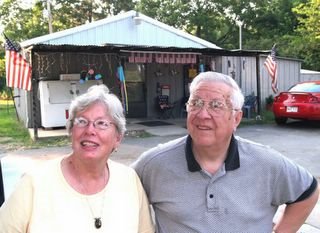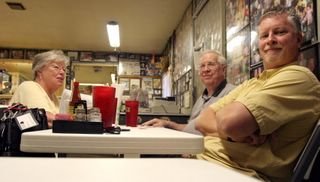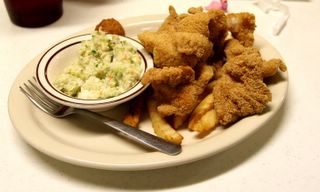 (mom & dad at the Georgetown restaurant 7.1)
(mom & dad at the Georgetown restaurant 7.1) 

By Tim Bousquet
The Daily Citizen
Tuesday, November 16, 2004
Now this is catfish.
Yea, sure, you can find catfish just about anywhere in Arkansas. But, all southern pride aside, much of what passes for catfish 'round these parts, well, leaves something to be desired.
If you want the real thing, the Arkansan catfish of legend, you'll have to work for it. Take Hwy 36 down through Kensett and West Point, pass the "Road Ends 12 Miles Ahead" sign, and keep winding through the White River flood plain until you think you're completely lost - you're just about there.Just before the pavement ends at the Georgetown boat ramp, there on the left, sits what looks like an abandoned filling station. There's no sign, and a sketchy patch of gravel may have once been a parking lot. A concrete slab serves as front stoop, and a rickety wooden door is entrance to an ancient metal shell of a building, the Georgetown One Stop.
You have arrived. Have a seat and a pleasant woman - that'd be Joanna Taylor - will drop by with some iced tea. No need for a menu - the only choice here is sweetened or unsweetened tea, and it's just assumed everyone wants catfish.While you're waiting for your meal, you might strike up a conversation with some of the other customers. Like you, they likely come from somewhere else - Little Rock maybe, or Batesville, more than a few from Searcy - and are usually in a mood for a little chatting up.
The decor is decidedly tres funk, Arkansan style. Taylor had to tear out the booths a while back to make room for more seating, which she crunched around a dozen or so tables, some of which have tablecloths. A few thousand photos of hunters and fisherpeople with their trophies adorn the wall, all donated by customers through the years, and plastic fish hang from the ceiling."Watch out!" says a hand-written sign taped to a giant swordfish, lest someone stand up and get poked.
"I wouldn't want to spend any money on decorating," says Taylor. "That would take away from what we're doing here. It's all about the catfish."Indeed. This is, without doubt, the finest catfish in the land. Light as a cloud, not too fishy, and fresh, newly fallen dew fresh.No need to gussy up this catfish. Taylor serves it plainly, maybe a hush puppy or two on the plate, with a side plate of sliced onion, tartar sauce, lemon and a pickle. Have as much as you want, Taylor will keep it coming until you tell her to stop, which might be a good long time.The trick, she says, is simple: she gets her fish direct from commercial fishermen working the White River, and she serves it fresh, never frozen.She's meticulous with her product, working through the filets, serving up fish as fat-free as possible, changing her oil daily - the kind of care long lost to the inland chain restaurants.Taylor landed in Georgetown herself in 1997, a refugee from Little Rock and a divorce. She went to work with her sister Jeannie, who had bought the One Stop, a gas station-mini mart.Georgetown was the first city in Arkansas, and once a thriving river port and railroad terminus. But time has passed it by. The tracks were pulled up long ago, and the old grid of streets surrounds mostly vacant fields. Aside from the boat ramp, there's not much reason to go there anymore.The town sign says 126 people live there, but Taylor doubts it."It's more like 80, and that's if you count the dogs and cats," she says. However many, it's not enough to support a gas station."I told Jeannie she should serve fish," says Taylor. Instead, her sister handed Taylor the business and told her to have at it.At first, she served only the local farmers, who would stop by for lunch. They liked her food so much they started showing up for breakfast."Oh, whatever they want," she says. "The farmers are my best customers, and I know what they want. Just so much eggs, just enough sausage. I'll cook anything but grits."Taylor has never advertised, but news of this unlikely place spread by word of mouth. The mini-mart side of the business soon disappeared, although it still serves as a wild life check station, just to keep the hunters coming around."We took the pumps out about eight years ago. People kept backing into them."Nowadays, Taylor can be found at work Tuesdays through Saturdays, 7 a.m. to 8:30 p.m. Her business is catfish central, but if you really want something else, she'll fry you up a hamburger or some chicken strips, or a plate of eggs in the morning. She does all this with a single cook, Roy Grady, and a part-time waitress and dishwasher.Business is booming. Harding University students have discovered her, and she struggles to find space for all the customers. Sometimes she asks regulars to help make room by sitting around a prep table in the kitchen. Still, Taylor refuses to even think about expanding."I couldn't do this if I got any bigger," she says. "There's not enough fresh fish in the river, so I'd have to use frozen fish like the chain restaurants."That would ruin everything."
